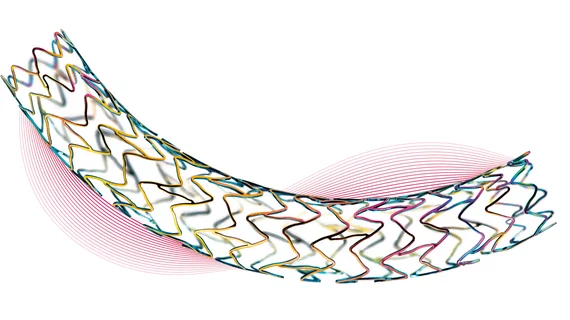Ultra-thin Orsiro stent gains FDA approval
The ultra-thin Orsiro drug-eluting stent (DES) has received FDA approval and is now commercially available in the United States, device manufacturer Biotronik announced Feb. 22.
The approval was supported by the results of BIOFLOW-V, a trial which compared Orsiro to Abbott’s Xience stent among 1,344 patients undergoing percutaneous coronary intervention. Two-year outcomes were reported at Transcatheter Cardiovascular Therapeutics 2018 and showed 7.5 percent of patients randomized to receive Orsiro met the primary endpoint of target lesion failure (TLF), compared to 11.9 percent of patients in the Xience group. TLF encompassed a composite of cardiac death, target vessel-related MI and target lesion revascularization.
Although death rates were nearly equal between the two groups, Orsiro was linked to significantly lower rates of target vessel MI (5.3 percent vs. 9.5 percent), target lesion revascularization (2.6 percent vs. 4.9 percent) and late stent thrombosis (0.1 percent vs. 1 percent).
"Orsiro has set a new standard for safety and efficacy clinical endpoints, including statistically lower target lesion revascularization and target vessel MI rates," David Kandzari, MD, U.S. principal investigator of BIOFLOW-V and director of interventional cardiology at Piedmont Heart Institute in Atlanta, said in a statement. "BIOFLOW-V data are the best clinical outcomes witnessed with modern DES. It was largely thought that efficacy findings were unsurpassable, but Orsiro proves we can further reduce event rates with meaningful innovation."
Kandzari spoke with Cardiovascular Business in September about the two-year results of BIOFLOW-V and said while the trial wasn’t designed to tease out which characteristics of the stents impacted outcomes, both the strut thickness and bioresorbable polymer may have played a role. The Orsiro is a bioresorbable polymer sirolimus-eluting stent with a strut thickness of 60 microns, while the Xience is a durable polymer everolimus-eluting stent with struts of 81 μm.
“There’s certainly a wealth of information and a growing body of information supporting this ultra-thin strut hypothesis, that thinner struts are associated with less injury to the vessel wall, less turbulent flow within the artery, perhaps less inflammation and improved healing as well,” Kandzari said at the time.
The Orsiro is available in 52 sizes ranging from 2.25 to 4.0 mm in diameter and up to 40 mm long, making it the longest DES available in the U.S., according to Biotronik. It received its CE mark approval in 2011 and has been used to treat more than 1 million patients worldwide, the company said.

